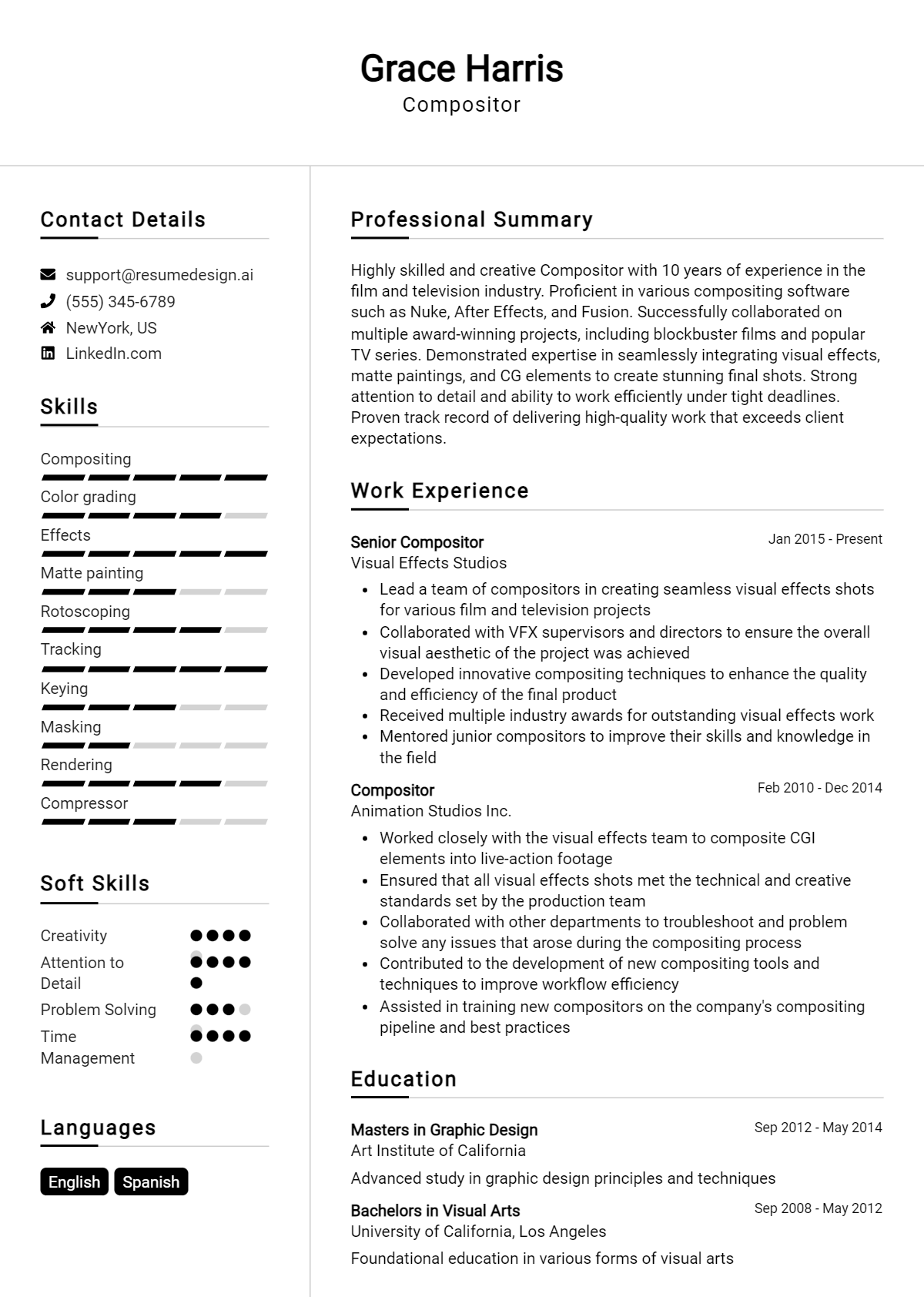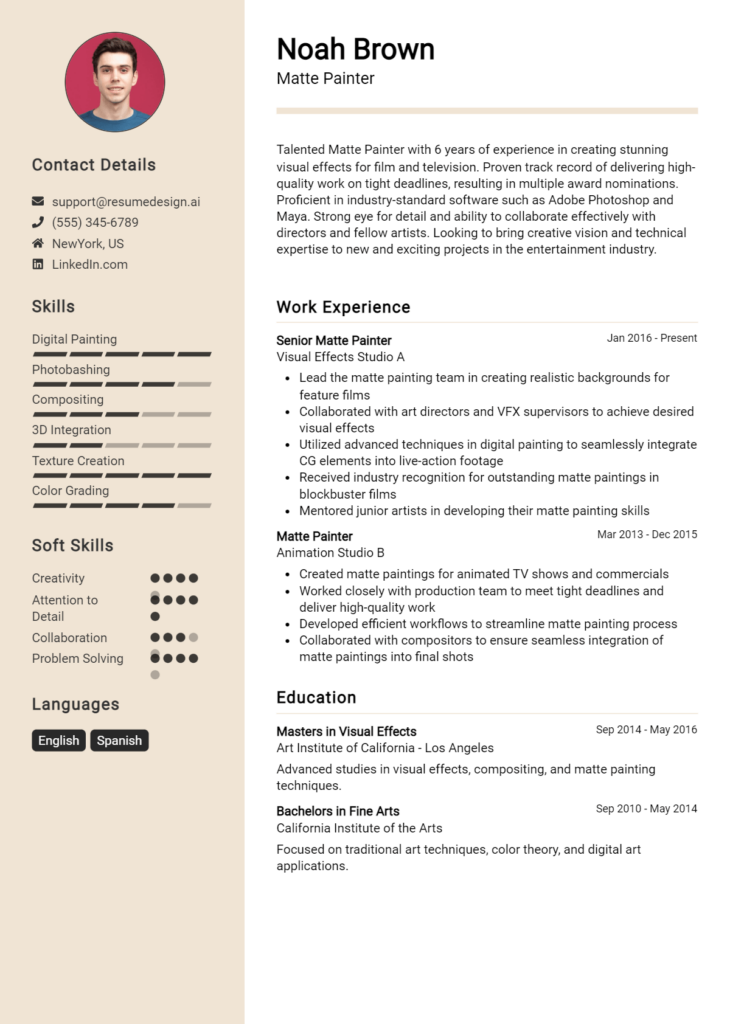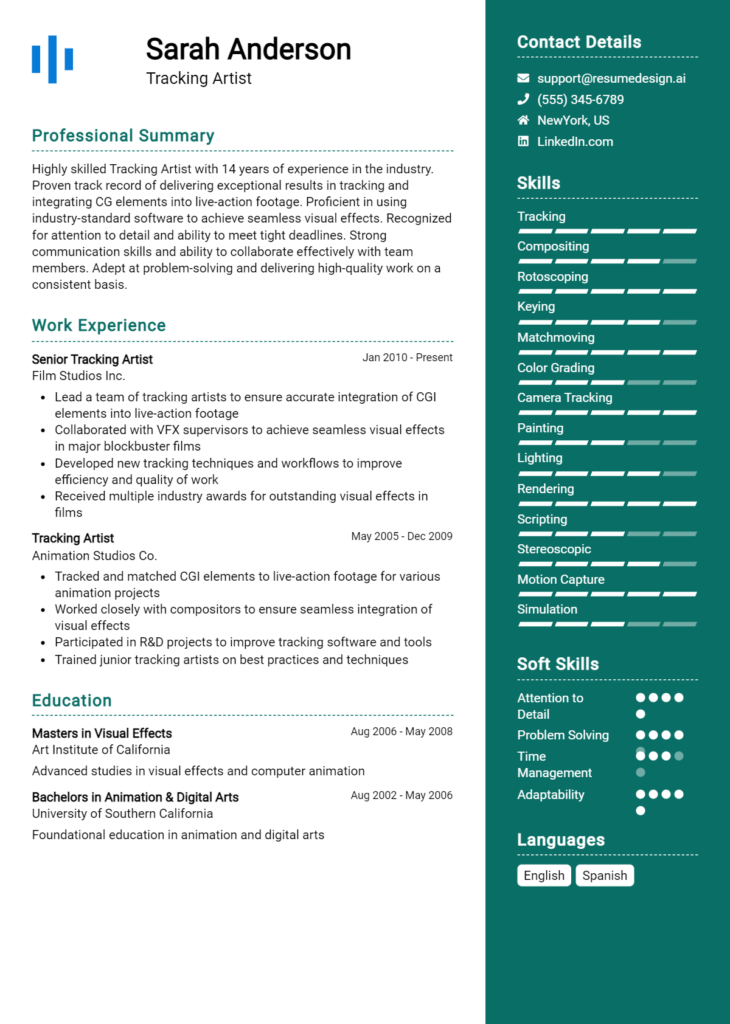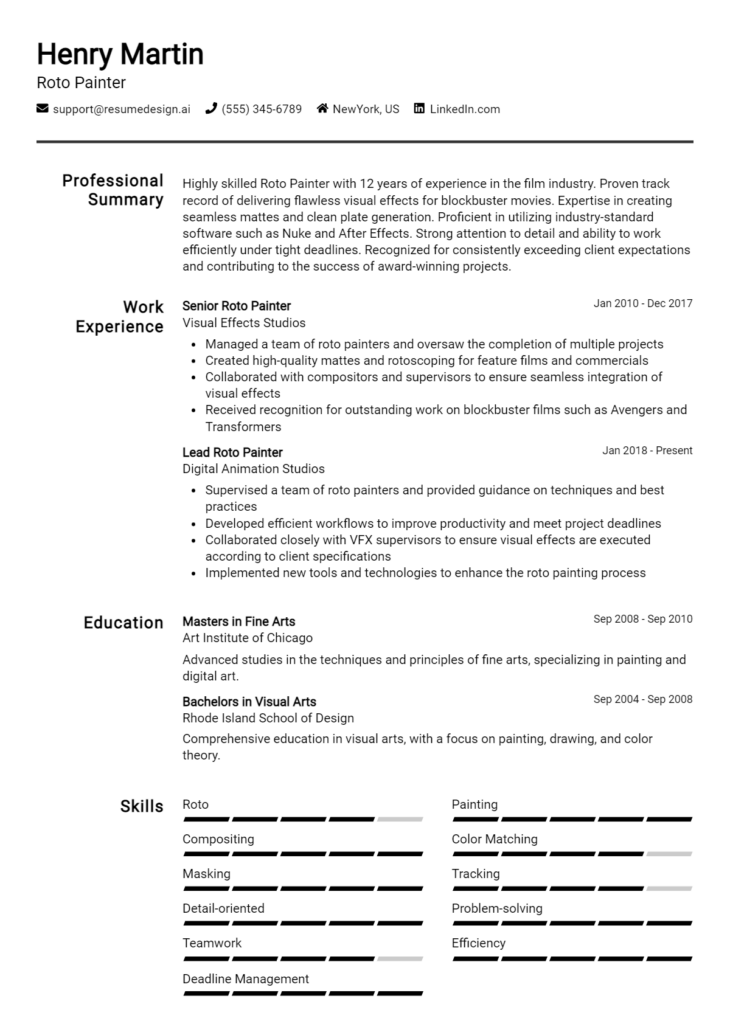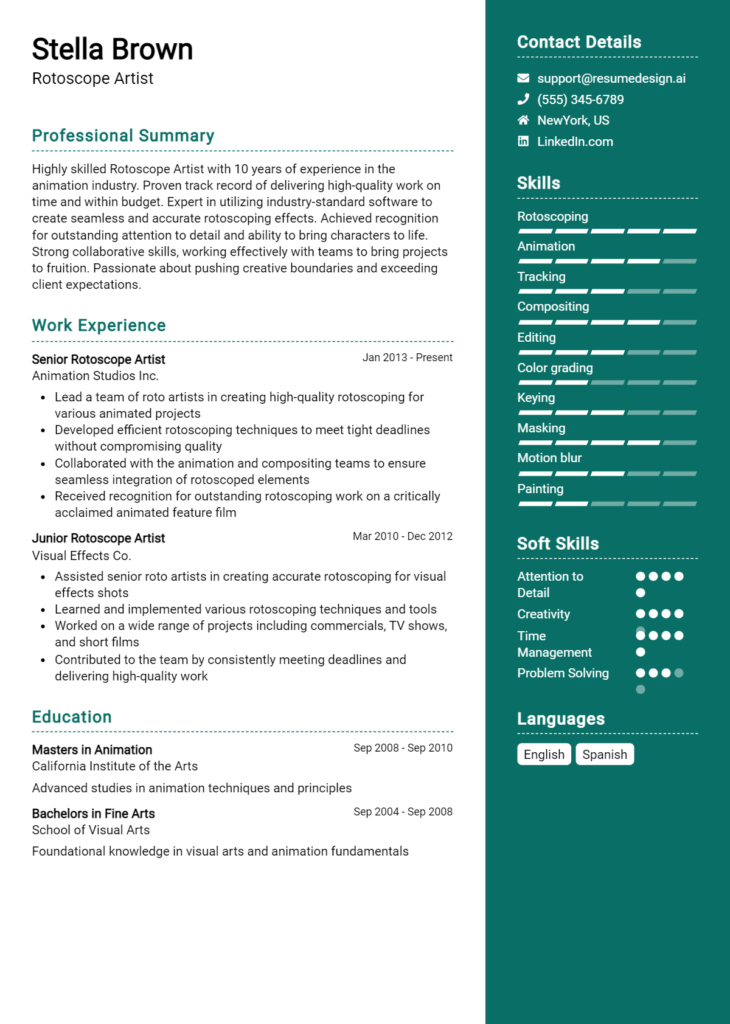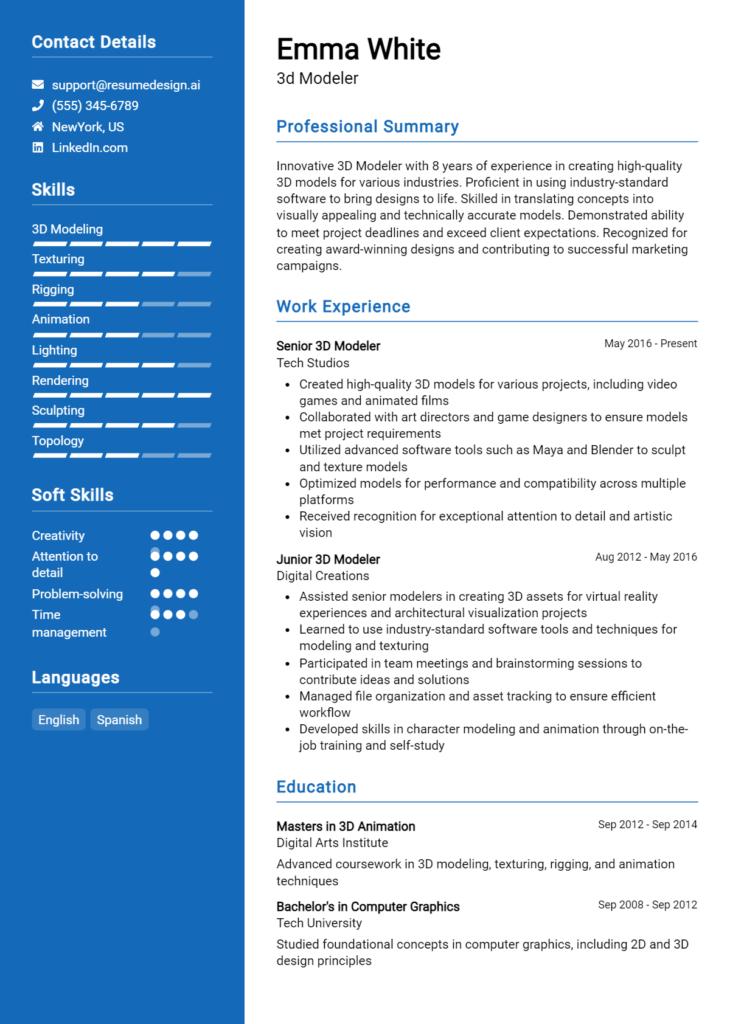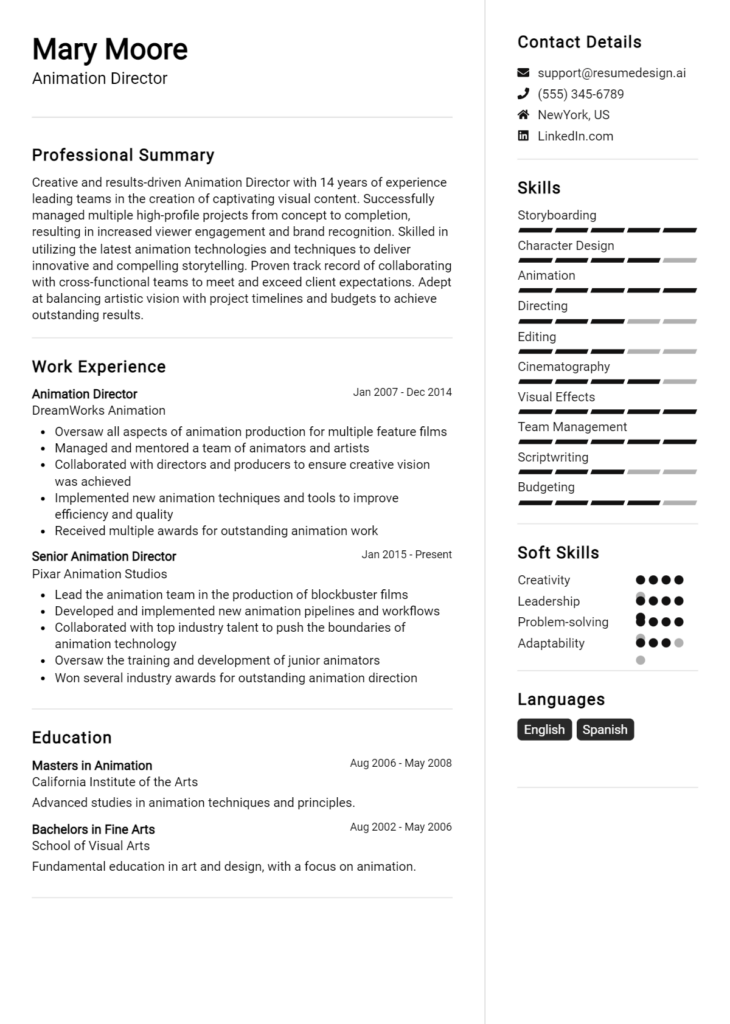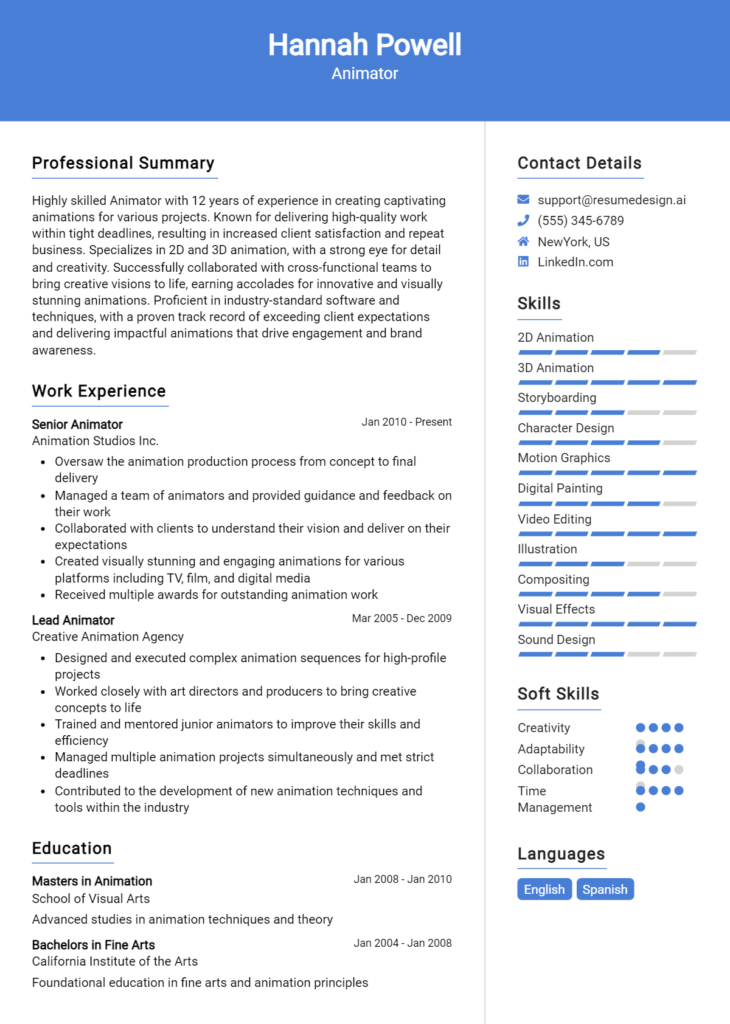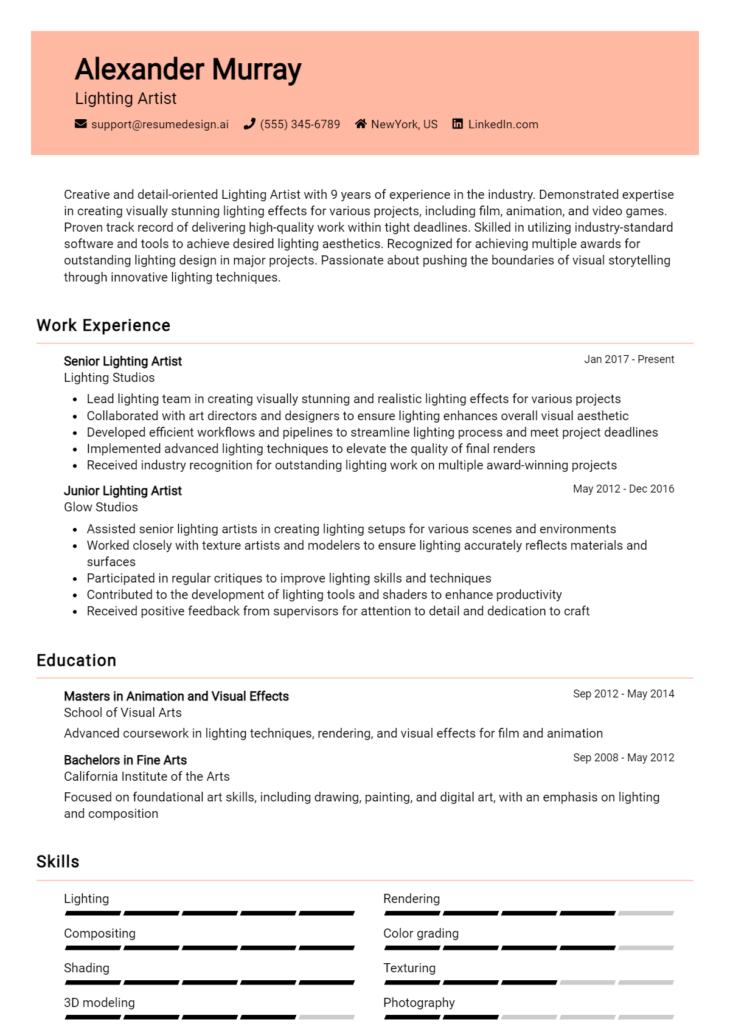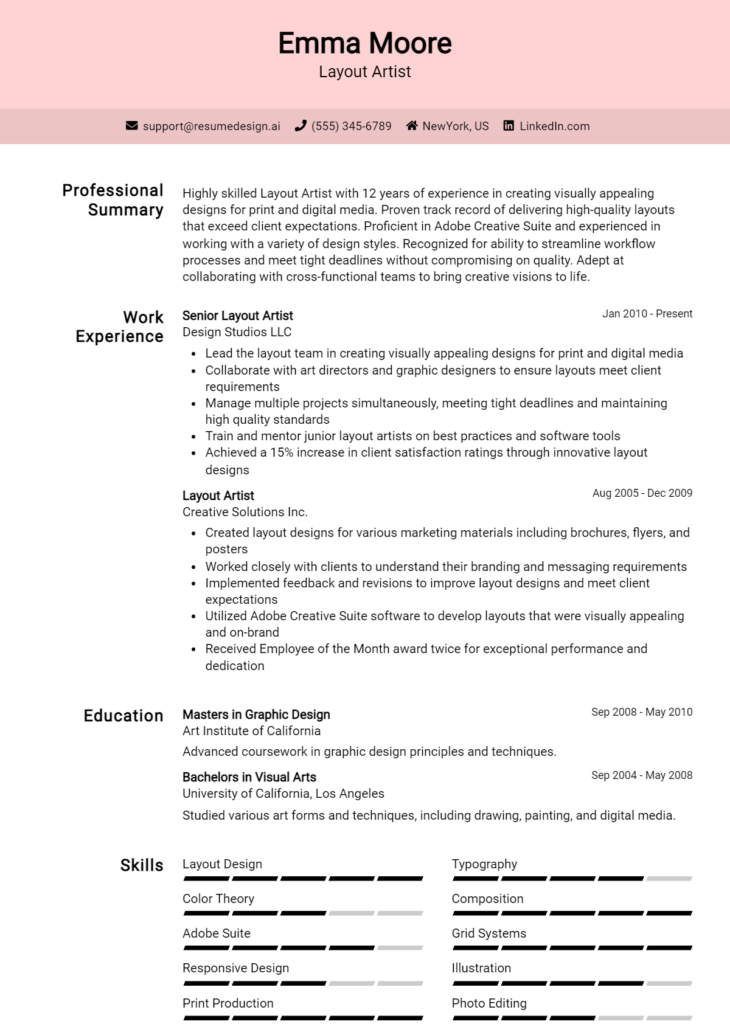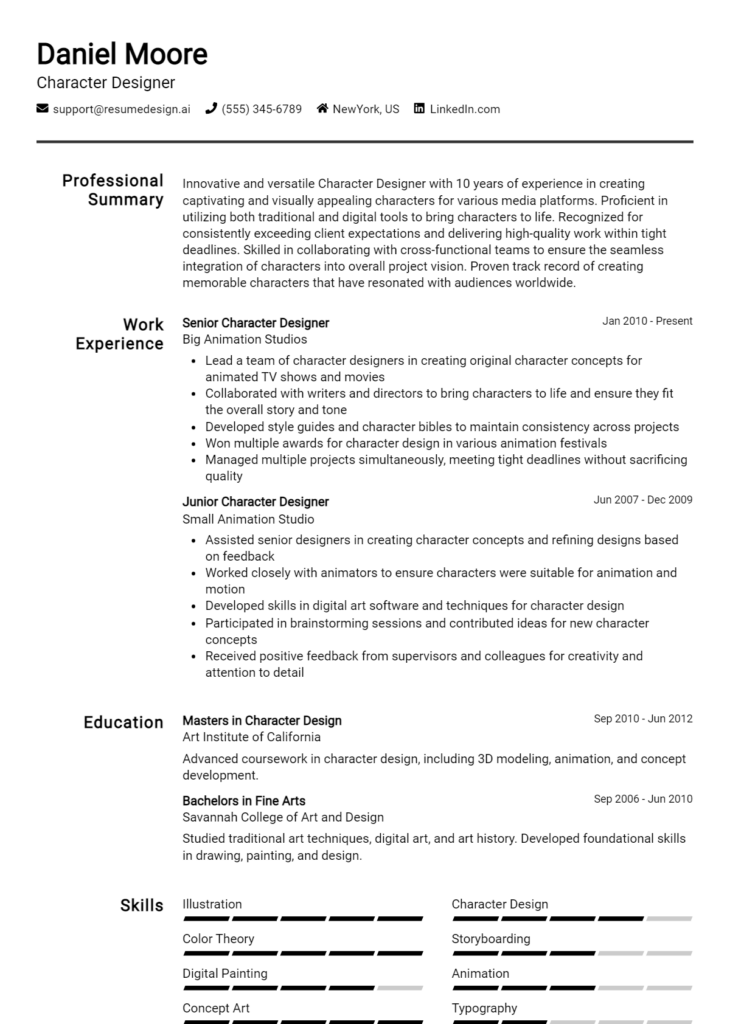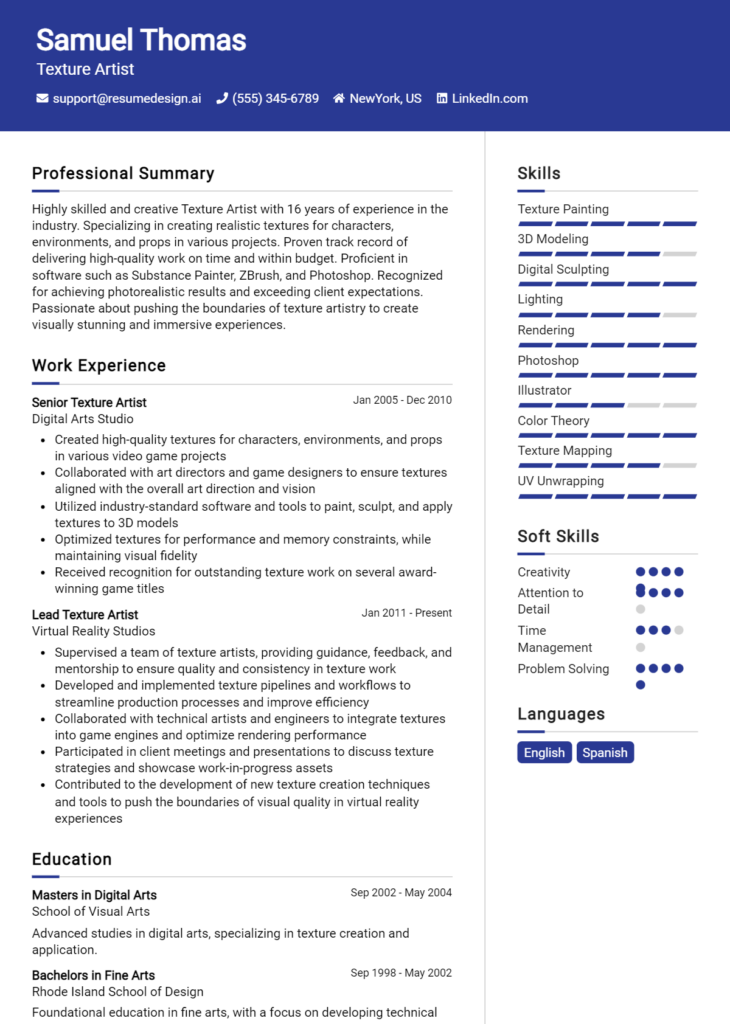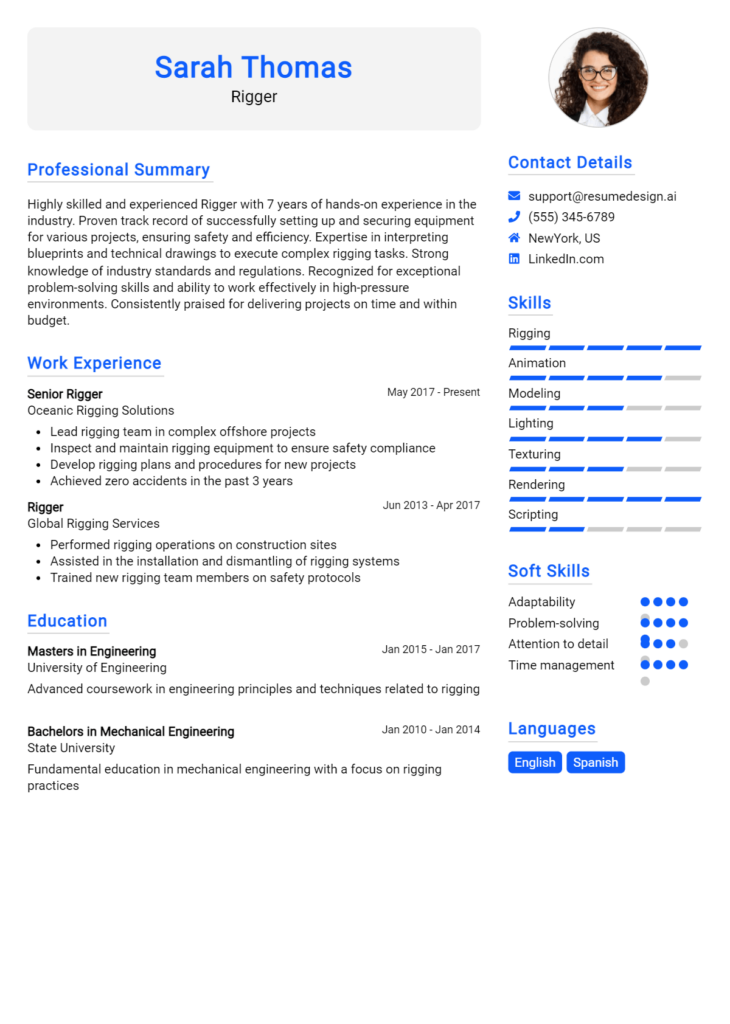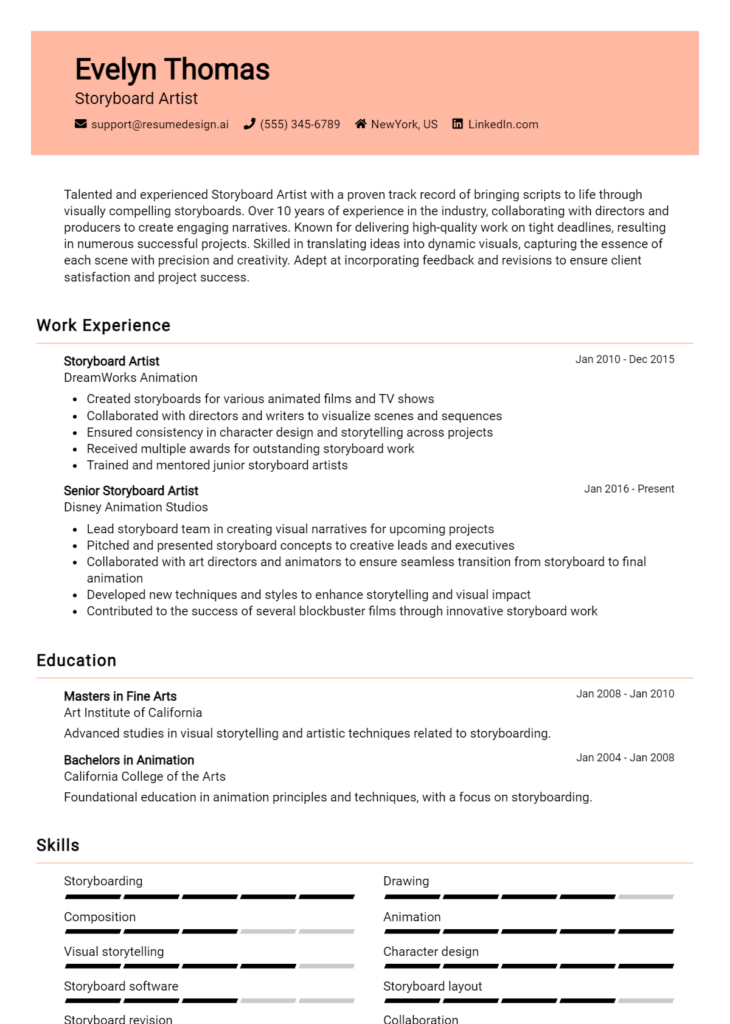Compositor Core Responsibilities
A Compositor plays a vital role in the post-production process, blending visual elements from various departments to create seamless, high-quality images. This position requires strong technical skills in software like Nuke or After Effects, alongside operational expertise in color correction, layering, and visual effects. Problem-solving abilities are crucial for troubleshooting issues and ensuring the final product aligns with the artistic vision. A well-structured resume that highlights these skills is essential for showcasing a Compositor's qualifications and contributing to the organization’s success.
Common Responsibilities Listed on Compositor Resume
- Integrating multiple visual elements into cohesive final images.
- Collaborating with directors, editors, and visual effects teams.
- Performing color grading and correction to enhance visual quality.
- Using compositing software to create and adjust layers.
- Troubleshooting technical issues during the compositing process.
- Ensuring continuity and consistency across all visual elements.
- Preparing deliverables for various formats and platforms.
- Managing project timelines and meeting deadlines.
- Maintaining organized files and documentation for projects.
- Staying updated with industry trends and software advancements.
- Conducting quality control checks on final outputs.
- Communicating effectively with team members and stakeholders.
High-Level Resume Tips for Compositor Professionals
In the competitive world of visual effects and post-production, a well-crafted resume is crucial for Compositor professionals seeking to make their mark. Your resume is often the first impression you leave on potential employers, serving as a visual showcase of your skills, experience, and achievements in the industry. A strong resume not only highlights your technical capabilities but also tells the story of your career journey and the unique contributions you can bring to a project. This guide will provide practical and actionable resume tips specifically tailored for Compositor professionals, ensuring you present your best self to prospective employers.
Top Resume Tips for Compositor Professionals
- Tailor your resume to each job description by incorporating relevant keywords and phrases that match the specific requirements of the position.
- Showcase your relevant experience prominently, including any projects you have worked on that demonstrate your compositing skills and creativity.
- Quantify your achievements where possible, using metrics to illustrate the impact of your work, such as improved project turnaround times or enhanced visual quality.
- Highlight industry-specific skills such as proficiency in software like Nuke, After Effects, or Fusion, as well as any additional tools or plugins you are adept at using.
- Include a portfolio link that showcases your best work, ensuring it is easily accessible and organized for quick viewing.
- Utilize a clean, professional layout that emphasizes clarity and readability, making it easy for hiring managers to navigate your resume.
- Incorporate a summary statement at the top of your resume that captures your professional identity and career goals in the field of compositing.
- List any relevant certifications or training that demonstrate your commitment to continuous learning and professional development in the compositing field.
- Keep your resume concise, ideally one page, unless you have extensive experience that warrants additional space—prioritize quality over quantity.
By implementing these tips, you can significantly enhance your chances of landing a job in the Compositor field. A well-structured and targeted resume will not only help you stand out from the competition but also effectively communicate your value to potential employers, paving the way for exciting new opportunities in your career.
Why Resume Headlines & Titles are Important for Compositor
In the competitive field of visual effects and post-production, the role of a compositor is crucial in bringing together various elements of a scene to create a cohesive final product. A well-crafted resume headline or title serves as a powerful introduction to a candidate's qualifications, allowing hiring managers to quickly gauge their suitability for the role. An impactful headline should be concise, relevant, and directly related to the job being applied for, summarizing key skills or experiences in a way that captivates attention and invites further exploration of the resume.
Best Practices for Crafting Resume Headlines for Compositor
- Be concise: Limit your headline to one impactful phrase.
- Use role-specific language: Incorporate terminology that aligns with the compositor position.
- Highlight key strengths: Focus on your most significant skills or achievements.
- Avoid clichés: Steer clear of overused phrases that lack substance.
- Tailor to the job description: Customize your headline for each application to reflect the employer's needs.
- Include relevant software expertise: Mention specific tools or technologies you excel in.
- Showcase years of experience: If applicable, indicate your level of experience in the industry.
- Be authentic: Ensure your headline accurately represents your professional identity.
Example Resume Headlines for Compositor
Strong Resume Headlines
Award-Winning Compositor with 5+ Years of Experience in Feature Films
Creative Visual Effects Compositor Proficient in Nuke and After Effects
Detail-Oriented Compositor Specializing in Seamless Integration of Live Action and CGI
Weak Resume Headlines
Compositor Seeking New Opportunities
Experienced VFX Artist
The strong headlines are effective because they immediately convey the candidate's specific skills and accomplishments, showcasing their unique value proposition to potential employers. They highlight relevant experience and technical proficiency, making them stand out in a crowded applicant pool. Conversely, the weak headlines fail to impress as they are overly generic and lack the detail needed to capture interest, leaving hiring managers with little motivation to delve deeper into the resume.
Writing an Exceptional Compositor Resume Summary
A resume summary is a crucial component of a Compositor's resume, serving as a dynamic introduction that succinctly highlights relevant skills, experiences, and accomplishments. In the competitive field of visual effects and post-production, a well-crafted summary can quickly capture the attention of hiring managers, providing them with a snapshot of your qualifications and potential contributions to their team. It should be concise, impactful, and tailored to the specific job you are applying for, ensuring that it resonates with the needs of the employer and positions you as a strong candidate.
Best Practices for Writing a Compositor Resume Summary
- Quantify achievements: Use numbers and percentages to demonstrate your impact in previous roles.
- Focus on skills: Highlight specific technical skills, software proficiencies, and artistic abilities relevant to the compositor role.
- Tailor the summary: Customize your summary to align with the job description, emphasizing the most relevant experiences.
- Be concise: Keep your summary to 2-4 sentences for maximum clarity and impact.
- Showcase relevant experience: Mention notable projects or companies you've worked with to establish credibility.
- Use action verbs: Start sentences with strong action verbs to convey a sense of accomplishment and initiative.
- Include soft skills: Incorporate interpersonal skills such as teamwork and communication that enhance your technical abilities.
- Avoid jargon: Use clear language that can be easily understood by hiring managers who may not be familiar with industry-specific terminology.
Example Compositor Resume Summaries
Strong Resume Summaries
Detail-oriented Compositor with over 5 years of experience in visual effects for film and television. Successfully led a team in delivering high-quality composited shots for a major blockbuster, resulting in a 30% reduction in post-production time.
Creative Compositor skilled in Nuke and After Effects, with a proven track record of enhancing visual storytelling through seamless integration of CGI and live-action footage. Contributed to projects that earned two Emmy nominations.
Versatile Compositor with expertise in color correction and matte painting, recognized for developing innovative techniques that improved workflow efficiency by 25%. Collaborated on award-winning animations for both commercial and independent films.
Weak Resume Summaries
Experienced Compositor looking for new opportunities in the industry. I have worked on various projects and have a good understanding of visual effects.
I am a Compositor with some experience in the field. I am willing to learn and adapt to new challenges in my next job.
The strong resume summaries are effective because they provide specific examples of achievements, quantify results, and clearly demonstrate the candidate's relevant skills and experience. In contrast, the weak summaries lack detail, fail to convey any significant accomplishments, and are too generic, making it difficult for hiring managers to understand the candidates' true value and potential contributions to their teams.
Work Experience Section for Compositor Resume
The work experience section of a Compositor resume is critical as it provides hiring managers with a comprehensive view of the candidate's technical capabilities and contributions to previous projects. This section not only demonstrates the candidate's proficiency in compositing software and techniques but also highlights their ability to manage teams and coordinate effectively to deliver high-quality visual content. By quantifying achievements and ensuring that the experience aligns with industry standards, candidates can significantly enhance their appeal, showcasing their value to prospective employers.
Best Practices for Compositor Work Experience
- Highlight specific software and tools used, such as Nuke, After Effects, or Fusion.
- Quantify achievements, such as the number of projects completed on time or the percentage of efficiency improvements.
- Emphasize collaboration with cross-functional teams, including directors, animators, and editors.
- Detail leadership roles, such as mentoring junior compositors or leading project teams.
- Include awards or recognition received for outstanding work.
- Align experience descriptions with industry standards and terminology.
- Showcase problem-solving skills with specific examples of challenges overcome.
- Focus on the impact of your contributions on overall project success.
Example Work Experiences for Compositor
Strong Experiences
- Led a team of 5 compositors on a major feature film, resulting in a 20% reduction in turnaround time for visual effects sequences.
- Implemented a new color grading technique that increased client satisfaction scores by 30% on a high-profile project.
- Collaborated with the animation team to integrate live-action footage with CGI, resulting in a seamless final product that won the Best Visual Effects award at a national film festival.
- Trained 3 junior compositors in advanced compositing techniques, leading to their successful promotion within the company.
Weak Experiences
- Worked on various projects that required compositing skills.
- Participated in team meetings and contributed ideas.
- Assisted in the post-production process for multiple films.
- Helped with general tasks related to visual effects.
The examples of strong experiences are considered effective because they provide clear, quantifiable outcomes and demonstrate specific technical skills and leadership abilities. They highlight achievements that had a tangible impact on projects, showcasing the candidate's value to potential employers. In contrast, the weak experiences lack specificity and fail to illustrate the candidate's role or contributions meaningfully. They do not provide measurable results or indicate a depth of experience, making them less impactful in a competitive job market.
Education and Certifications Section for Compositor Resume
The education and certifications section of a Compositor resume is crucial as it showcases the candidate's academic background and industry-specific qualifications. This section not only reflects the candidate's formal education but also underscores their commitment to continuous learning and professional development. Highlighting relevant coursework, specialized training, and recognized certifications can significantly enhance a candidate's credibility, demonstrating their alignment with the job role and readiness to meet industry standards. Employers often look for these indicators of expertise and dedication when evaluating potential hires, making this section a pivotal element of the resume.
Best Practices for Compositor Education and Certifications
- Focus on relevant degrees, such as a Bachelor's in Animation, Film Production, or Visual Effects.
- Include industry-recognized certifications from established institutions or software vendors.
- Detail relevant coursework that directly pertains to compositing techniques and software.
- Highlight any specialized training or workshops that enhance your skills in compositing.
- Keep the section up-to-date by removing outdated certifications and adding new ones.
- Consider the format and clarity of your listings to ensure they are easy to read and understand.
- Use bullet points for clarity and to make important information stand out.
- Tailor this section to align with the specific job description and requirements of the position you are applying for.
Example Education and Certifications for Compositor
Strong Examples
- Bachelor of Fine Arts in Animation, University of Southern California, 2020
- Adobe Certified Expert (ACE) in After Effects, 2021
- Certificate in Visual Effects Production, Gnomon School of Visual Effects, 2019
- Completed coursework in Advanced Compositing Techniques and 3D Animation, 2020
Weak Examples
- Diploma in Graphic Design, 2015 (not directly related to compositing)
- Certification in Microsoft Office Suite, 2018 (not relevant to compositing)
- High School Diploma, 2010 (not enough detail for a professional role)
- Outdated certification in a now obsolete software program, 2016
The strong examples are considered effective because they directly relate to the skills and knowledge required for a compositor role, demonstrating a clear path of education and relevant certifications that align with industry needs. In contrast, the weak examples lack relevance to the field of compositing, either showcasing qualifications that do not enhance the candidate's suitability for the role or are outdated and no longer valued in the industry. By providing strong examples, candidates can better position themselves as qualified applicants for compositor positions.
Top Skills & Keywords for Compositor Resume
As a Compositor, having the right skills is essential for creating visually stunning and cohesive images in film, television, and other media. A well-crafted resume that highlights both hard and soft skills can significantly enhance your job prospects by demonstrating your technical proficiency and your ability to collaborate effectively within a creative team. In this competitive field, showcasing the right blend of skills not only sets you apart from other candidates but also illustrates your capability to handle various challenges in the post-production process. A strong skill set can communicate your readiness to contribute to projects and your commitment to delivering high-quality work.
Top Hard & Soft Skills for Compositor
Soft Skills
- Attention to Detail
- Communication Skills
- Team Collaboration
- Problem Solving
- Time Management
- Adaptability
- Creativity
- Critical Thinking
- Organizational Skills
- Flexibility
Hard Skills
- Proficiency in Compositing Software (e.g., Nuke, Adobe After Effects)
- Understanding of Color Theory
- Knowledge of Visual Effects Techniques
- Familiarity with 3D Software (e.g., Maya, Cinema 4D)
- Experience with Keying and Rotoscoping
- Competence in Matte Painting
- Understanding of Motion Graphics
- Ability to Work with Different File Formats
- Experience in Compositing for Live Action and Animation
- Knowledge of Video Editing Software (e.g., Premiere Pro)
By honing these skills and effectively showcasing them in your resume, you can increase your chances of landing a job in the dynamic field of compositing. Additionally, coupling these skills with relevant work experience will further bolster your resume, making you a compelling candidate for potential employers.
Stand Out with a Winning Compositor Cover Letter
Dear Hiring Manager,
I am writing to express my interest in the Compositor position at [Company Name], as advertised on [Job Board/Company Website]. With a solid background in visual effects and a keen eye for detail, I am excited about the opportunity to contribute to your team and help bring your creative vision to life. My experience in blending live-action footage with CGI elements, along with my proficiency in industry-standard software, positions me as a strong candidate for this role.
In my previous position at [Previous Company Name], I successfully collaborated with a team of artists and technicians to create stunning visual narratives for various film and television projects. My role involved integrating multiple layers of visual elements, ensuring seamless transitions, and maintaining the overall aesthetic quality of the final output. I am well-versed in software such as Nuke, Adobe After Effects, and Fusion, and have a thorough understanding of color theory, lighting, and compositional techniques that enhance storytelling through visuals.
I am particularly drawn to [Company Name] because of its innovative approach to storytelling and commitment to pushing the boundaries of visual effects. I am eager to bring my expertise in compositing and my passion for visual storytelling to your esteemed organization. I believe that my skills in problem-solving and teamwork will allow me to thrive in your creative environment, and I look forward to the opportunity to contribute to your upcoming projects.
Thank you for considering my application. I am excited about the possibility of discussing how my background, skills, and enthusiasms align with the needs of your team. I look forward to the opportunity to speak with you soon.
Sincerely,
[Your Name]
[Your Phone Number]
[Your Email Address]
Common Mistakes to Avoid in a Compositor Resume
When applying for a position as a compositor, your resume serves as your first impression to potential employers in the visual effects and animation industry. A well-crafted resume showcases your skills and experience, but common pitfalls can undermine your chances of landing an interview. Here are some mistakes to avoid when writing your compositor resume:
Neglecting Relevant Skills: Failing to highlight key compositing software and technical skills, such as Adobe After Effects, Nuke, or Fusion, can make your resume less appealing to hiring managers.
Using Generic Language: Generic descriptions that lack specificity can dilute your achievements. Instead, use quantifiable terms to describe your contributions and impact on past projects.
Overloading with Technical Jargon: While it's important to demonstrate your expertise, overloading your resume with technical jargon can alienate readers who may not be familiar with complex terms. Strive for balance and clarity.
Ignoring Visual Presentation: A compositor's work is visual by nature, so your resume should reflect an understanding of design principles. A cluttered layout or poor formatting can detract from your skills.
Omitting Collaborative Experience: Compositors often work in teams with other artists and departments. Not mentioning your ability to collaborate can signal a lack of teamwork skills that are essential in this industry.
Listing Irrelevant Experience: Including unrelated job experiences can dilute your focus. Tailor your resume to emphasize experiences that specifically relate to compositing and visual effects.
Not Including a Demo Reel: Failing to provide a link to your demo reel can be a missed opportunity. A demo reel is crucial in showcasing your compositing work and should be easily accessible.
Forgetting to Proofread: Typos and grammatical errors can undermine your professionalism. Always proofread your resume multiple times or have someone else review it to catch any mistakes.
Conclusion
As a compositor, your role is crucial in the post-production process, where you blend visual elements to create a seamless final product. Key skills for this position include proficiency in software like Adobe After Effects and Nuke, a strong understanding of color grading, and a keen eye for detail. It’s also essential to have experience with visual effects, motion graphics, and an understanding of the principles of animation and cinematography.
In today's competitive job market, having a compelling resume that showcases your technical abilities and creative flair is vital. Tailoring your resume to highlight specific projects and your unique contributions can set you apart from other applicants.
Now is the perfect time to review your compositor resume and ensure it reflects your skills and experiences effectively. Utilize available resources to enhance your application process. Explore our resume templates to find a design that fits your professional style. You can also take advantage of our resume builder to easily create a polished document. For inspiration, check out our resume examples that can guide you in structuring your own resume. Lastly, don’t forget to ensure your cover letter is just as impressive by using our cover letter templates.
Take action now and polish your resume to shine in your next job application!

